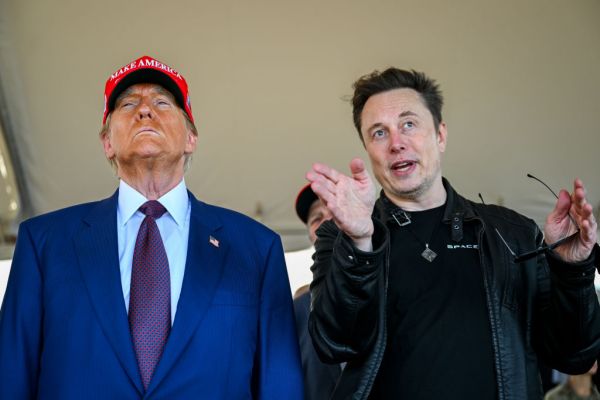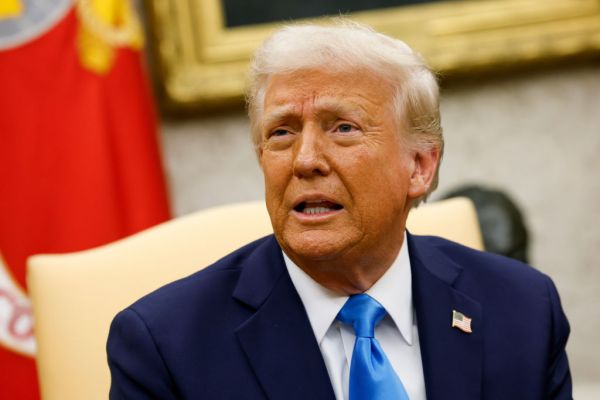We’ve reached the stage of national decadence at which the more thoughtful and substantive a policy critique is, the better the chance it’ll be ignored or dismissed out of hand by policymakers.
By that standard, this sharp screed by Manhattan Institute senior fellow and Dispatch contributor Jessica (formerly Brian) Riedl about Elon Musk’s Department of Government Efficiency, a.k.a. DOGE, must be one of the least essential analyses of our time.
Riedl has studied the anatomy of the federal budget in gory detail and is pleading with well-meaning Americans to understand three things. One: Most federal spending is locked up in things that their representatives won’t touch—Medicare, Social Security, defense, veterans’ affairs, interest. Two: We have buried ourselves so deep in annual deficits that stabilizing the budget will take literally 30 years. Three: Donald Trump’s plans for steep tax cuts paired with modest spending cuts will make the problem vastly worse.
Until we begin to reckon with those three facts, any effort to cut the budget is so fundamentally unserious as to amount to a hoax. Given the immensity of the task, focusing on comparative trivialities like “waste,” bureaucracy, and foreign aid ends up obfuscating the problem more than remediating it.
Elon Musk is a newbie to government, but I’ll pay him the compliment of assuming that he’s studied the federal ledger in enough detail already to have grasped the truth of Riedl’s points. If so, he must know that DOGE’s work is futile—as a fiscal project, except on a very modest scale. Trying to put a meaningful dent in overspending by gutting outfits like USAID is like trying to pay off one’s student loans by scaling back on lattes at Starbucks. The math won’t math.
But DOGE isn’t a fiscal project. It’s an ideological project. And from that standpoint, it’s been pretty successful.
Let’s talk about Politico Pro.
An ideological project.
Politico is a well-known, influential news site that covers politics. I cite it in this column all the time. As a blue-chip member of the “mainstream media,” it routinely displays a not-so-veiled disdain for the Trumpist project and an indispensable supply of information on what’s happening behind closed doors in Washington. With MAGA now in control of the government, populist Republicans despise it for both reasons.
Politico Pro, meanwhile, is an arm of Politico designed for professionals whose jobs require access to in-depth, real-time intelligence on policy developments. A lower-tier subscription will get you reporting “across 22 coverage areas and an advanced technology platform that includes legislative and regulatory tracking tools, government directories, transcripts, outreach trackers and more.” The next tier up will get you “a library of analyses and infographics outlining key policy and legislative issues as they develop.”
Politico is a general-interest publication that’s free to read. Politico Pro is a tool for motivated wonks that costs thousands of dollars per year for a subscription, the public policy equivalent of Bloomberg Terminal. Members of Congress, federal agency employees various and sundry, lobbyists, and corporations all might plausibly find use in it.
On Wednesday, MAGA influencers on Elon Musk’s social media platform began implying that Politico had received $8 million—$8 million!—in USAID funds over the last 12 months. Musk himself picked up the allegation and touted it as evidence of why DOGE’s work is necessary. Within hours, White House spokeswoman Karoline Leavitt informed the press that such lavish government “subsidies” to Politico would not continue. The normally sluggish federal bureaucracy can really move when it wants to.
Superficially, the news was a mini-scandal about fiscal irresponsibility. Eight million dollars is a lot of money for one agency to pay for reporting on policy. You can agree with Riedl that the feds should get their priorities straight on spending while also thinking USAID shouldn’t be burning through seven figures in taxpayer cash to read Politico.
But wastefulness wasn’t why populists objected to the expenditure. “This is the biggest scandal in news media history,” MAGA propagandist Benny Johnson huffed, noting that Politico just so happened to miss payroll right after DOGE functionally shut down USAID. Correlation implies causation: USAID must have been funneling our hard-earned tax dollars to Politico to keep it afloat, presumably in exchange for flattering coverage of left-wing causes like foreign aid. Then, when DOGE turned off the tap, Politico was suddenly left high and dry.
It wasn’t a fiscal scandal, it was a conspiracy. No wonder the so-called MSM is reliably biased toward the left: The left has been secretly bankrolling it—with your money. Word that covert collusion among the right’s enemies had been exposed soon reached Congress, with Rep. Lauren Boebert mentioning it at a committee hearing. On Thursday morning, the president got wind of it and began president-ing all over the place. “LOOKS LIKE BILLIONS OF DOLLARS HAVE BEEN STOLLEN [sic] AT USAID, AND OTHER AGENCIES, MUCH OF IT GOING TO THE FAKE NEWS MEDIA AS A ‘PAYOFF’ FOR CREATING GOOD STORIES ABOUT THE DEMOCRATS,” he wrote. “THIS COULD BE THE BIGGEST SCANDAL OF THEM ALL.”
Soon other eyebrow-raising federal expenditures began circulating online. Tens of millions of dollars paid by the government to the New York Times? Taxpayer money landing in the lap of Bulwark co-founder and Never Trumper extraordinaire Bill Kristol? Another USAID grant made to an outfit headed by … Jeffrey Epstein? Here, just a few weeks into Trump’s presidency, was vindication for those who insisted contra Riedl that DOGE’s work was vital.
And it is vital, sincerely—as long as you understand that it isn’t a fiscal project. It’s an ideological project.
Culture war all the way down.
USAID didn’t fund Politico to the tune of $8 million.
Per the Washington Post, it paid for Politico subscriptions, and over the span of two fiscal years, it spent $44,000. That was far less than Donald Trump’s party spent on it: “In total, 38 Republicans in the House spent over $300,000 on Politico subscriptions in the first nine months of 2024, and committees led by Republicans expensed almost $500,000 of Politico subscriptions in the same time period.” As recently as this week, a White House department bought access to Politico Pro for 15 users.
Among those many GOP outlays to the publication was a $7,150 expenditure from the office of—ta da—Lauren Boebert. I can understand why she and other Republicans might want to trade money (admittedly, a lot of money!) for the service Politico is providing, a thing we typically describe as a “transaction.” What I can’t understand is why, in Karoline Leavitt’s words, she would want to “subsidize” it. Maybe she’ll explain.
Also: The New York Times didn’t receive tens of millions from the feds (although it did receive some money for subscriptions). Entities with “New York” in their title did. Bill Kristol didn’t get a fat envelope from the Biden administration. A pro-democracy group on whose board Kristol sits got a grant from a fund that got a grant from a foundation that got a grant from USAID. And Jeffrey Epstein … well, actually, Jeffrey Epstein did receive money from USAID. But not that Jeffrey Epstein.
A thoughtful Riedl-ian response to all this would be to note, as reporter Lee Fang did, that there really is plenty of waste and dubious ideological nonsense in the federal budget for DOGE to dig into, including at USAID. Just a few months ago, Fang pointed out, the Wall Street Journal flagged $50 billion in apparent fraud in the Medicare Advantage program alone. If you’re serious about trimming the fat from the federal budget, logically you should focus on the most obviously blubbery parts.
If instead you’re focused on penny-ante Politico, what you’re actually doing is exploiting a universally appealing aspiration like “fiscal responsibility” as a pretext to justify carrying out ideological purges of your cultural enemies. Elon and his populist admirers don’t care about balancing the budget; it’s a mathematical impossibility absent cuts to entitlements, as I’ve said, and it’s out of sync with big-government nationalist priorities. What they care about is demagoging and ultimately defunding any entity that might impede the postliberal cultural agenda.
That’s the only way to explain the outsized smear campaign over USAID payments specifically that’s dominated MAGA social media this week, ringled by Musk. USAID is a scapegoat for America-First-ers who resent foreign aid in principle and are therefore heavily invested in justifying DOGE’s otherwise baffling “fiscal” decision to make the agency a prime target. The result, as detailed by Bulwark publisher Sarah Longwell, has been an outburst of lies and false allegations towards recipients of agency money that’s extreme even by populist standards. The goal isn’t to show that USAID has spent cash “wastefully,” it’s to delegitimize all of the modern right’s cultural opponents—the press, Hollywood, Never Trump, anyone who might oppose Trump, really—by accusing them of being on the take from a progressive sugar daddy that’s using taxpayer money as its sugar jar.
At one point, President Elon even resorted to promoting Russian propaganda about the agency supposedly having paid for celebrities to visit Ukraine. This is the same guy whose toadies are right now busily rooting around in numerous federal storehouses of sensitive information, doing God knows what, seemingly without supervision by the president or by Congress.
When New Right Jacobin Christopher Rufo tweets a photo of the Department of Education with the caption, “I’m going in,” it’s not the prospect of uncovering wasteful spending in the agency’s books that thrills Trumpists. It’s the idea that the inner sanctum of a leftist indoctrination machine has been penetrated by a well-known culture warrior. Conspiracies will be unearthed. The machine will be sabotaged, or commandeered.
It’s “the Twitter files” all over again, basically, this time with the federal government as the target.
And so DOGE as a vehicle for fiscal sanity is, plain and simple, a hoax. If you’re taking it at face value because you’re a well-meaning conservative who understandably likes the idea of culling unnecessary spending, I am begging you once again not to miss the forest for the trees.
Having said all that, though: It is smart politics in a reptilian way.
Fooling the people.
A few days ago, Politico asked former Obama adviser David Axelrod what he thought of congressional Democrats trying to rally support for USAID against Musk’s demolition effort.
He wasn’t a fan. “My heart is with the people out on the street outside USAID,” he said, “but my head tells me: ‘Man, Trump will be well satisfied to have this fight.’ When you talk about cuts, the first thing people say is: Cut foreign aid.”
It’s true. Ask Americans if the government spends too much money in general and they overwhelmingly say yes. Identify specific forms of spending, though—the military, Medicare, education, etc—and they reliably say that the feds spend too little. The great exception, per the Associated Press, is foreign aid: In 2023, 69 percent said we’re spending too much on that.
The populist jihad against USAID’s spending, uninformed as it is in so many particulars, nonetheless has the virtue of aligning Trump and Republicans with that 69 percent. By ignoring Axelrod and choosing to fight on this battlefield, liberals have placed themselves on the other side—which, thanks to the Politico hysteria, primes them to have to argue that spending hundreds of thousands of taxpayer dollars on media “subscriptions” is a good use of the public’s money.
That’s a pretty neat trick by the right, no? Not only have they set themselves up for an easy political win, they’ve done it by going to war over a form of spending that in 2019 amounted to less than 1 percent of the federal budget.
In fact, exaggerating marginal political disputes and then routing the left over them has become something of a MAGA specialty. While the Battle of Politico was playing out online on Wednesday, Trump was busy signing an executive order banning “male competitive participation in women’s sports” where federal money is involved. He did so surrounded by women and little girls, a photo op worth its weight in gold.
In December, the president of the NCAA told Congress that, out of more than 500,000 college student-athletes, fewer than 10 are trans. A Pew Research survey published in 2022 found less than 1 percent of American adults identify as transgender. It’s marginal stuff, but no matter: Trump’s campaign invested heavily in the issue in its advertising against Kamala Harris and I don’t blame them. They knew which side of it most voters were on. There’s evidence that it paid off for them on Election Day.
One reason why the trans issue and the USAID kerfuffle punch above their weight politically is because, although marginal in a strict sense, they’re stand-ins for larger and more salient ideological disputes. It’s not trans athletes per se that Americans worry about, it’s progressives’ determination to browbeat others into submitting to whatever novel and dubious cant has most recently captured the left’s imagination, even about something as basic as biology. It’s not USAID that Americans despise, it’s the sense that their political leaders don’t much like them and would rather spend money abroad on causes abroad that they favor politically and that advance the public interest here at home only questionably.
But it’s also true that one of the president’s great talents as a demagogue is his ability to hype trivial matters as major scandals and then claim total vindication from them—whether the facts support that or not. On Wednesday, for example, the Federal Communications Commission finally released the unedited footage of CBS News’ interview with Kamala Harris from October. Trump and his media toadies have insisted for months that the conversation was bowdlerized by CBS to make Harris sound far more cogent than she actually was, an in-kind contribution to her campaign that boosted her chances of victory. The unedited clip proves that was a lie: “It is Trump, not CBS, who is perpetrating ‘a giant Fake News Scam,’” Reason’s Jacob Sullum explained after reviewing the video.
So what, though? It long ago became received wisdom in MAGA America that CBS News cooked the tape, repeated and reinforced ad nauseam by the president and numerous propagandists. The truth of the matter will be kept from them by all of their trusted media outlets and Trump will continue to insist that the unedited clip confirmed his suspicions in every aspect—just as he did this morning, in a Truth Social post. The Politico episode will play out the same way: Populists know the mainstream media is evil, they assume that the left is bankrolling it in corrupt ways, and all of their suspicions were neatly confirmed by the smear campaign on Musk’s platform on Wednesday. The truth will never reach them. The president and his media phalanx will make sure of it.
In the internet age, a lie doesn’t travel halfway around the world before the truth has its boots on. It travels all the way around, 20 times over, and is relaxing with a cocktail before the truth so much as stirs. Very soon, it will be unassailable MAGA lore that USAID was funding the late Jeffrey Epstein’s pedophilic reign of terror and that Never Trumpers like Bill Kristol were somehow involved in it.
Whatever else this might be, it’s not about spending, efficiency, or fiscal responsibility. One could easily argue the opposite: As pricey as a Politico Pro subscription is, it may well be cheaper on balance for a congressional office to purchase one than to hire staffers to independently gather the same policy information that the platform provides. And while transparency in government is always welcome, the DOGE emperor’s interest in highlighting ticky-tack expenditures like Politico Pro subscriptions instead of meaningful fraud to programs like Medicare arguably does more to impair the public’s understanding of our fiscal crisis than to promote it.
“Sunlight is the best disinfectant,” Louis Brandeis famously said. That’s what Riedl is offering. What Elon Musk is offering is more like a laser, designed to scald and destroy. Is it any surprise which of them has a wider following among the postliberal right?







Please note that we at The Dispatch hold ourselves, our work, and our commenters to a higher standard than other places on the internet. We welcome comments that foster genuine debate or discussion—including comments critical of us or our work—but responses that include ad hominem attacks on fellow Dispatch members or are intended to stoke fear and anger may be moderated.
With your membership, you only have the ability to comment on The Morning Dispatch articles. Consider upgrading to join the conversation everywhere.